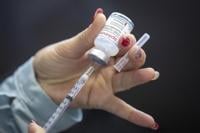During the height of the COVID-19 pandemic, ºÃÉ«tv provinces introduced vaccine mandates for health-care workers and required people to show proof of vaccination to go to bars and restaurants. Social media posts claim that people who aren't vaccinated are being denied needed organ transplants, but that after their death their other, healthy organs can be transplanted to others. This claim is partly true – some ºÃÉ«tv hospitals have required transplant patients to be vaccinated against COVID-19 – but it is missing important context. Requirements for being placed on a transplant list differ between programs across the country, and even between different organs. All pre-transplant requirements, including vaccines, are meant to increase the likelihood of a successful transplant.
In a post on Twitter, currently being rebranded to X, a that in Canada, people who aren't vaccinated can't receive organ transplants, but that their healthy organs can be "harvested" and given to people who are vaccinated.
The post comes after the family of an Ontario man that he died after he was refused a kidney transplant because of his vaccination status. In 2021, an Alberta woman was denied an organ transplant after she refused to be vaccinated against COVID-19.
Rating: Partly true, but missing context
There is no single policy governing organ transplants in Canada. Depending on the province, the criteria for receiving an organ transplant is established by provincial health authorities, by individual hospitals or by transplant doctors.
Some hospitals do require patients receiving specific organ transplants to be vaccinated against COVID-19 before they will be considered for an organ transplant, unless there a medical reason preventing them from being vaccinated.
For example, The London Health Sciences Centre in London, Ont., requires patients to receive at least two doses of a COVID-19 vaccine before for a heart or liver transplant, unless they have an exemption approved by their transplant team, according to its website. The hospital said in an email that it stopped requiring vaccinations for kidney transplant patients in May, but they remain strongly recommended.
Candidates are also evaluated for other medical conditions before they are approved for a transplant, to ensure it is successful, the hospital said. Patients who don't qualify for a referral through the transplant program can also get a second opinion at a different hospital.
Different regions, different policies
In Manitoba, unvaccinated people , but vaccination is strongly recommended and patients must discuss their choice not to be vaccinated with a doctor, Transplant Manitoba said on its website.
COVID-19 vaccination was required for kidney transplants – the only organ transplant available in the province – between January 2022 and January 2023, Shared Health, Manitoba's health-care co-ordination agency, said in an email. While 15 vaccines are recommended for vaccine recipients in the province, only the meningococcal ACWY vaccination is currently required.
In British Columbia, transplant recipients are not required to be vaccinated against COVID-19, though it remains strongly recommended and more than 92 per cent of patients on transplant wait-lists have received at least two doses of a COVID-19 vaccine, Elaine Yong of BC Transplant said in an email.
"After a recipient receives the gift of life from a donor, several potent immunosuppressing medications are needed to prevent organ rejection. These medications severely suppress the recipient’s immune system, which makes recipients particularly vulnerable to life-threatening infections," Yong wrote.
All transplant candidates in the province are required to receive a pneumococcal vaccine and everyone waiting for a transplant, except for a liver, are required to receive hepatitis B, varicella, influenza, Tdap (tetanus, diphtheria and pertussis) and MMR (measles, mumps and rubella) vaccines.
"It is important that these vaccines be given before transplant because the recipient’s body develops a stronger protective immune response to these vaccines before starting potent immunosuppressant drugs," she said.
Alberta and Saskatchewan's provincewide health authorities both said by email they don't have policies requiring vaccination.
In Saskatchewan, where the only organ transplants performed are kidney transplants, transplant physicians may require immunizations, or other medical treatments, before putting a patient on the wait-list.
In Alberta, a transplant team of physicians, nurses, pharmacists and ethicists determine whether a patient is eligible for an organ transplant. Immunization, including COVID-19 vaccination, is one of the factors considered.
Policies changing
Dr. Deepali Kumar, past president of the American Society of Transplantation and director of transplant infectious diseases at the UHN's Ajmera Transplant Centre, said the decision to require vaccination is made by individual transplant programs.
While many of those programs required COVID-19 vaccination, those policies are now changing as research suggests the COVID-19 virus is getting weaker, as well as the fact that a large portion of the ºÃÉ«tv population is vaccinated and because effective retroviral treatments are available.
"We knew that the vaccine was effective in preventing COVID, we knew that if you got COVID after you had a transplant, it would be very severe and you could die from it. And, if you're getting an organ from somebody, a gift of life from somebody, it's your obligation to do the best you can to take care of that organ," Kumar said in an interview.
The vaccination requirement was similar to requirements that people stop smoking before they get a lung transplant and not drink alcohol before getting a liver transplant, she said.
Kumar, who has multiple on the effect of vaccination on , said research has found that while immunosuppression reduces the antibody response provided by the vaccine, there is still a response from T-cells – an important type of white blood cell of the immune system – that can prevent serious illness and death.
It's especially serious for lung transplant recipients, she said, because lung transplant recipients require more immunosuppressing drugs and because the lung is the organ most affected by COVID-19.
"Transplant recipients were dying of COVID in front of our eyes," Kumar said.
The ºÃÉ«tv Society of Transplantation recommended that lung transplant programs require COVID-19 vaccination in a released in January. In that statement, it said that at the beginning of the pandemic, before vaccines were available, lung transplant recipients who contracted COVID-19 had a mortality rate of between 25 per cent and 30 per cent.
Ethical and legal considerations
Several hospitals in the United States have also denied organ transplants to people who are not vaccinated against COVID-19, according to .
Those policies have been defended in scientific papers by doctors who say they are ethically justified because unvaccinated recipients are at a for COVID-19 complications and might refuse other medical instructions. They have also been on the grounds that other steps can be taken to protect patients from COVID-19 and that the policies don't help doctors build the trust that would lead patients to get vaccinated.
In Canada, courts have found that vaccine mandates for transplant recipients are constitutional.
In November 2022, the found that the decision by transplant doctors to deny an organ transplant to Annette Lewis, who had refused to be vaccinated against COVID-19, was "made to maximize the best use of a scarce resource and the best possible outcome for Ms Lewis, with the greatest chance of a life free from life-threatening complications, through science-based and medical consensus-based management of all possible identifiable risks."
The three-judge panel found that "the COVID-19 vaccine requirement is not a prohibition on access to medical treatment at all; indeed, it is part of the medical treatment" and that the rule was not discriminatory because Lewis had the choice to be vaccinated.
The Supreme Court declined to hear an appeal in the case.
Organ donors
Some transplant programs have required living organ donors – who can donate livers or kidneys – to be vaccinated to protect their health, Kumar said, adding that organ donation requires surgery and a hospital stay.
The vast majority of organ donors in Canada – like the vast majority of the population – have been vaccinated against the disease, Kumar said.
A lung from someone infected with COVID-19 would not be used for transplantation, she said, because it could infect the recipient, but kidney and liver transplants from people with the coronavirus have not transmitted the virus to recipients.
Sources
Social media claim can be found ()
()
()
()
()
()
()
()
()
()
()
()
()
About ºÃÉ«tv Press fact checks
You can find out more about ºÃÉ«tvhere and about ºÃÉ«tv Press Fact Checks here. To reach our fact-checking team with any tips, corrections or comments, please email us at cpfactcheck@thecanadianpress.com.






































